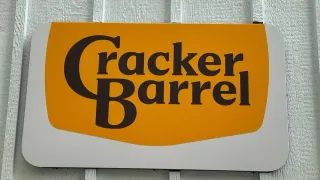
2 hours ago
Crumbl Cookies Co-Founder Sawyer Hemsley Comes Out
READ TIME: 3 MIN.
Sawyer Hemsley, the 33-year-old co-founder and Chief Brand Officer of Crumbl Cookies, made headlines this week by publicly coming out as gay in a heartfelt Instagram post. The announcement came after a surge of speculation and commentary about his sexuality across TikTok, Reddit, and other social media forums . These discussions were initially sparked by viral TikTok videos, with some users openly questioning aspects of Hemsley’s appearance, mannerisms, and online presence.
A particularly influential moment occurred when TikTok user @grantegibbs posted a video reacting to a clip of Hemsley, stating, “that man is so gay.” The comment rapidly spread, fueling further speculation and drawing public attention to Hemsley’s private life .
In response, Hemsley took to Instagram on August 25 to address the rumors directly. “Over the past little while, there have been people online trying to define me, twist things, and share conversations in ways that feel harmful. Instead of letting others write my story, I want to share it in my own words,” he wrote .
Hemsley’s statement continued: “The truth is, over the past few years I’ve come to understand and accept that I’m gay. It’s taken me a long time to really process this part of myself and even longer to feel comfortable enough to say it out loud. For most of my life, I didn’t have the clarity to answer the questions or respond to the rumors. Coming to terms with it has been overwhelming and, at times, scary — but it has also brought me peace, joy, and authenticity that I wouldn’t trade for anything” .
Hemsley also reflected on his upbringing in a Mormon family in Utah, noting, “I was raised with values that I still deeply love and respect.” He described his coming out as a journey of growth and honesty, expressing gratitude for the opportunity to reconcile his personal truth with his roots .
The reaction to Hemsley’s announcement has been largely supportive. Many praised his courage for sharing his story in his own words, particularly in the face of intense public scrutiny . Supporters across social media platforms have highlighted the importance of visibility for LGBTQ+ business leaders and the impact of authenticity in public life.
However, Hemsley’s experience also raises questions about privacy and the pressures faced by public figures in the digital age. The viral discourse preceding his announcement included not only supportive messages but also invasive speculation and, at times, harmful commentary. Hemsley addressed this directly, writing that he hopes “kindness, empathy, and love will lead the way” as people respond to his story .
Crumbl Cookies, co-founded by Hemsley and his cousin Jason McGowan in 2017 while they were students at Utah State University, has become one of North America’s fastest-growing dessert franchises. With over 1,000 stores across the US and 18 in Canada — and plans to expand into Australia — Crumbl’s rotating menu of oversized, indulgent cookies has won a devoted following. The brand’s social media presence, including viral menu items and celebrity collaborations, has further propelled its rapid growth .
Hemsley’s public coming out has added a new dimension to the company’s story, putting a human face to the brand’s success. For many LGBTQ+ individuals, seeing someone in a high-profile position within a mainstream, family-oriented brand embrace their identity can be both affirming and inspiring.
Hemsley’s journey is also notable for its intersection with faith and family. Raised in Utah’s Mormon community, he spoke candidly about the complexities of aligning his sexual identity with his upbringing. This aspect of his story resonates with many LGBTQ+ people who navigate similar journeys of self-acceptance in the context of religious or traditional backgrounds .
By publicly honoring both his roots and his authentic self, Hemsley joins a growing number of LGBTQ+ leaders who demonstrate that affirmation and tradition can coexist. His story serves as a reminder of the diverse experiences within the LGBTQ+ community and the ongoing need for spaces of understanding and support.
Hemsley’s decision to come out publicly is already having an impact beyond Crumbl’s customer base. Advocacy organizations and community leaders have underscored the significance of his message — particularly at a time when LGBTQ+ representation in business leadership remains rare. His emphasis on telling his own story, rather than letting others define it, highlights the importance of agency and self-determination for LGBTQ+ people everywhere .
As social media continues to shape the way stories are told and shared, Hemsley’s experience invites reflection on the responsibilities of both influencers and audiences. It also serves as an affirmation of the power of living openly, especially in environments where doing so may not always feel safe or simple.
In his own words, Hemsley concluded his statement with hope: “My hope is that kindness, empathy, and love will lead the way.”






